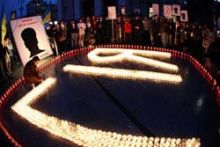On Sept. 16 the fourth annual rally in memory of the Ukrainian journalist Heorhii Gongadze took place on Independence Square in Kyiv, during which journalists, public figures, and concerned citizens paid homage to Gongadze and other murdered journalists. This traditional action, which was initiated in 2005, is organized by ordinary citizens who, by paying tribute to journalists who have been killed in the line of duty, seek to attract public and media attention to the situation in which journalists live and work.
The organizers appealed to journalists not to sell themselves out and to citizens, not to forget about their moral principles and remember those individuals who were not afraid to voice their positions.
What is the state of contemporary journalism in Ukraine? Has anything changed in the media since Gongadze’s death? The Day posed these questions to some of those who came to the Maidan to light a candle and pay tribute to the people who sought to uphold the truth.
Kostiantyn CHEKOTUN, Candidate of Physical and Mathematical Sciences:
“I have attended this rally for several years. We must demand progress in the investigation into this case. However, while voicing our demands, we realize that there will be no investigation. This has everything to do with the political situation in Ukraine, its rampant corruption. Nevertheless, we must attend such rallies to make it clear that a certain number of our citizens will never forget what happened. I believe that there was a burst of media activity for some time after Gongadze‘s disappearance. Perhaps for a year after the Orange Revolution there was an upswing, but now total corruption is once again returning to our journalism, as well as activity motivated only by money.
Taras KOMPANICHENKO, kobza, bandura, and lira player:
I think that such figures are very significant in journalism. Such people have a position, nobility, and journalistic integrity. Gongadze proved all this with both words and deeds. This rally reflects the struggle of the Fourth Estate for power. It serves to strengthen the importance of journalism in society. On their part, journalists should be stronger in resisting manipulation from the outside and learn to confront the owners of television channels or newspapers with their unbiased and truthful stands.
Heorhii Gongadze disappeared in Kyiv on Sept. 16, 2000. Two months later, in November, a headless body was found in a forest in Kyiv oblast. Forensic experts declared that it could be that of the missing journalist. On Nov. 28, 2000, Parliamentary Speaker Oleksandr Moroz played audio tapes in Ukraine’s Verkhovna Rada, insisting that they were proof of President Leonid Kuchma’s involvement in the journalist’s disappearance. These tapes were allegedly made by Mykola Melnychenko, a former officer of the State Bodyguard Service of Ukraine. The authenticity of these recordings has not been ultimately proven.
The Office of the Prosecutor General of Ukraine initiated criminal proceedings in connection with Gongadze’s disappearance. In the first part of the case, murder charges were laid. On July 8, 2008, the Supreme Court of Ukraine confirmed the verdict of the Kyiv Court of Appeals in regard to the accused, former militia officers Mykola Protasov, Valerii Kostenko, and Oleksandr Popovych. Protasov was sentenced to a prison term of 13 years, and the other two to 12 years each. Oleksii Pukach, the former head of the surveillance department, on whose orders the killers carried out their crime, is wanted in connection with Gongadze’s murder. The second part of the criminal case – to identify those who ordered and organized the murder – is still in the hands of Ukraine’s chief prosecutor.







